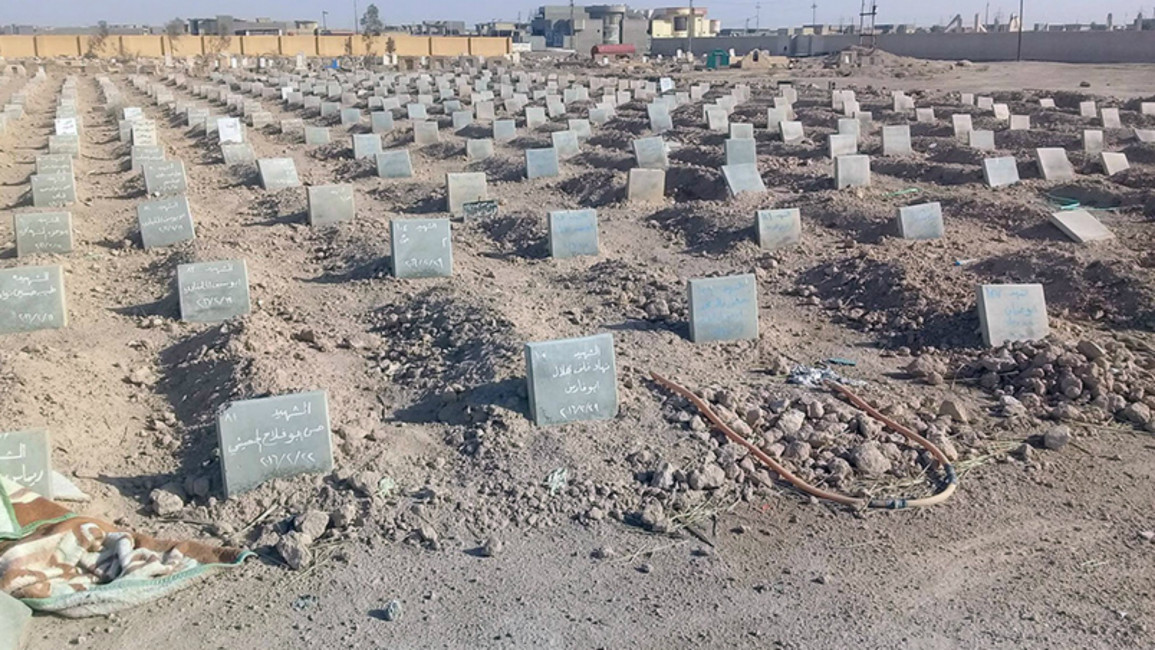Mass graves holding '400 IS victims' found in Iraq
Mass graves containing at least 400 suspected Islamic State group victims have been found near the militant group’s former bastion of Hawija in northern Iraq, the regional governor said on Saturday.
The string of grisly discoveries was made at a military base around three kilometres (two miles) from the city that the militants "turned into an execution ground", Kirkuk governor Rakan Said said.
"Not less than 400 people were executed," he said, adding that some were clad in the uniform of prisoners condemned to death while others wore civilian clothing.
IS was forced out of Hawija - 240 kilometres north of Baghdad - by Iraqi forces in October in a sweeping offensive that has seen the group lose the vast bulk of territory it seized in 2014.
As government troops have advanced across Iraq they have uncovered dozens of mass graves holding hundreds of bodies in areas that fell under the jihadists' brutal rule.
The burial pits near Hawija were discovered "thanks to witness accounts from local residents" given to the Iraqi military, General Mortada al-Luwaibi said.
Saad Abbas, a farmer from the area, told AFP that during the three years of IS control the group's fighters could be seen "driving around in cars with their prisoners".
"They would shoot them and then throw them to the ground or burn their bodies," Abbas said.
The discovery followed comments by Prime Minister Haider al-Abadi on Saturday who said the Islamic State group's occupation of northern Iraq and the battle to defeat it has caused more than $100 billion worth of damage.
"The damage caused by the IS occupation of Iraqi cities already amounts to more than $100 billion," Abadi said, speaking during a visit to Karbala.
"That's just the damage to the economy and infrastructure."
"The damage caused by the IS occupation of Iraqi cities already amounts to more than $100 billion," Abadi said.
"That's just the damage to the economy and infrastructure."
IS seized around a third of Iraq and parts of Syria in a sweeping 2014 advance.
But its self-declared "caliphate" has since been decimated by multiple offensives and squeezed into a pocket of territory on the Iraqi-Syrian border.
Iraqi forces launched an operation to retake the last IS-held towns in Iraq on Saturday, including the Euphrates valley town of Rawa and nearby villages.
The assault also aims to "clean open areas in the desert" of western Iraq, said Abadi, who is also head of the armed forces.
Home to around 8,900 people, mostly from Sunni tribes, Rumana is located on the north side of the Euphrates in west Anbar Governorate.
Rawa is the last town still held by IS apart from Albu Kamal, al-Qaim's twin town just across the Syrian border where the jihadists were still battling Damascus troops and allied forces on Saturday after mounting a surprise counterattack late on Thursday.
The recapture of the Rawa pocket would mark the final battleground defeat of IS in Iraq and sound the death knell of the “caliphate”.
Many of the group's top leaders have been killed as Syrian and Iraqi forces with backing from Russia, Iran and a US-led coalition rolled back the territorial losses that saw the militants declare a "caliphate" roughly the size of Britain.
But the whereabouts of the first among them, self-proclaimed "caliph" Abu Bakr al-Baghdadi, remains unclear. He has been reported killed or wounded many times but IS has never offered any confirmation.

![A pro-Palestinian encampment at Columbia persists, despite recent arrests. [Brooke Anderson/The New Arab]](/sites/default/files/styles/image_212x120/public/2024-04/417084c8-3251-4705-8422-058fca1d5709.jpg?h=ddb1ad0c&itok=M1RtdyYz)

